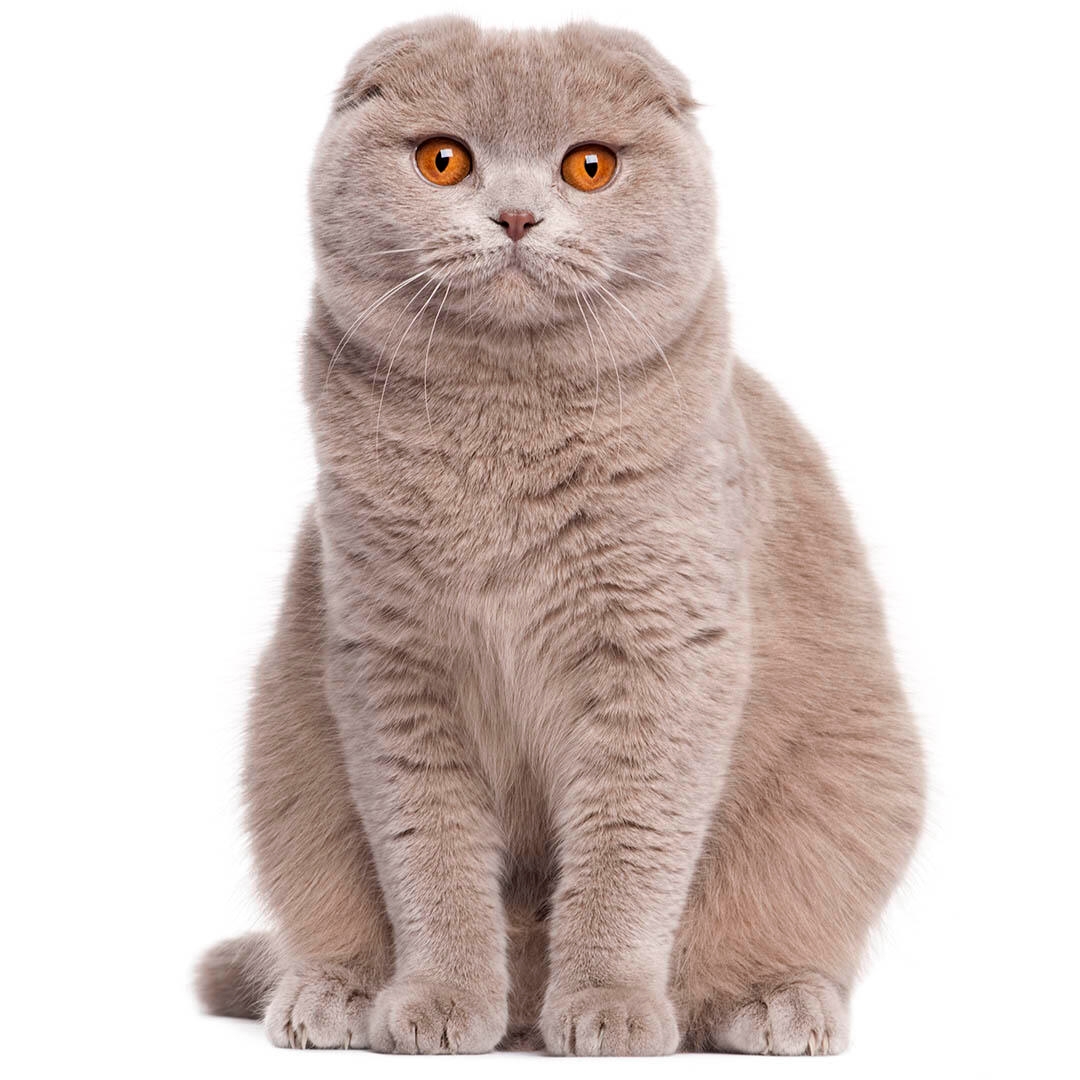
| Family-friendly: | 5/5 |
| Playfulness: | 3/5 |
| Intelligence: | 4/5 |
| Tendency to Vocalise: | 3/5 |
| Likes Other Pets: | 4/5 |
| Grooming needs: | 2/5 |
| Shedding: | 3/5 |
The Scottish Fold breed has ears that fold downwards due to an inherited defect that affects the cartilage in their ears. However, this defect will also affect the cartilage in the cat's joints, a condition called osteochondrodysplasia. This condition can lead to severe and painful arthritis.
The breed is also classified as brachycephalic; problems associated with this condition include;
- Brachycephalic airway obstruction syndrome: is a condition in brachycephalic (breeds with a short noses and squashed faces) breeds where breathing is obstructed and can lead to severe respiratory distress.
- Skin inflammation/infection: brachycephalic breeds have a short nose and a normal amount of facial tissue. This means there is often excess skin around their face which leads to skin folds- which is where soreness and infections are prone to develop.
- Eye ulcers: ulcers are painful erosions on the surface of the eye, they are more common in brachycephalic breeds due to their conformation, as their eyes tend to be more bulbous.
Scottish Fold cats are prone to:
- Polycystic kidney disease which is an inherited condition where cysts form in the kidneys. This affects kidney function and can eventually lead to kidney failure. However, it is worth noting that the risk of developing this disease in this breed is lower than in other cat breeds that are prone to the problem.
Testing available:
- DNA testing for polycystic kidney disease which tests whether or not a cat has the potential to be affected by this condition.
The Scottish Fold’s ancestry lies with farm cats, and as you may imagine, a Scottish farm cat needed to be a rugged and hardy animal. Although the show example has come a long way since those days, this is still a robust, tough natured cat. They are easily adaptable to most situations, not worried about loud or busy homes but equally at home in a quiet, single person’s abode. They are said to have a sweet disposition and a tiny voice which is used very rarely.
| Family-friendly: | 5/5 |
| Playfulness: | 3/5 |
| Intelligence: | 4/5 |
| Tendency to Vocalise: | 3/5 |
| Likes Other Pets: | 4/5 |
| Grooming needs: | 2/5 |
| Shedding: | 3/5 |
The Scottish Fold is named for the unique folded ears, a natural mutation which was first spotted in Scotland in the 1960’s. Whilst some breeders loved the appearance, numerous veterinary surgeons and British cat show judges determine it to be an undesirable deformity, which would prevent the cat from cleaning its own ears and is associated with cartilage problems. When folded-eared cats were bred to one another, deformities of the spine, hind legs and tail appeared therefore the Governing Council of the Cat Fancy (GCCF) decided against allowing the registration of the Scottish Fold.
The Cat Fanciers Association (CFA) in the US does recognise and register the Scottish Fold.
Scottish Fold litters will have both normal and folded eared kittens, and it is impossible to tell which will be which until around 4 weeks of age, and not guaranteed until around 12 weeks of age. Only folded eared examples can be shown, which makes them very popular, however the normal eared variety are vital to breeding programs as folds must be bred to normal ears to avoid health problems as much as possible.
The Scottish Fold will enjoy supervised access to a secure garden. The hunting instinct is stronger in some than others, depending largely on their mobility, so take this into account when considering whether to provide a secure cat run, or to cat proof an entire garden.
The Scottish Fold will appreciate some play using hunting ‘toys on strings’, the opportunity to climb cat-trees and a lap to sit on in an evening. They are not overly demanding and it is easy to forget to pay them attention in a busy household however, so ensure that you will have the time to devote to your cat.
Every cat is unique and each has their own particular likes, dislikes, and needs when it comes to food. However, cats are carnivores and every cat must obtain 41 different and specific nutrients from their food. The proportion of these nutrients will vary depending on age, lifestyle and overall health, so it's not surprising that a growing, energetic kitten needs a different balance of nutrients in her diet than a less active senior cat. Other considerations to bear in mind are feeding the right quantity of food to maintain 'ideal body condition' in accordance with feeding guidelines and catering to individual preference regarding wet or dry food recipes.
The short dense coat of the Scottish Fold cat is easily cared for and needs no special grooming, though brushing helps remove dead hairs. The Scottish Fold's ears are difficult for the cat to clean itself, so owners need to remove any wax or dirt build up from the outer ear to prevent ear infection.
Remember that a greasy coat can be evidence that your cat is no longer attempting to groom themselves, which can be indicative of poor or failing health. As with all cats, Scottish Folds benefit from regular vaccination, parasite control and an annual veterinary health check.
Fairly easy going, the Scottish Fold will enjoy most family homes or single homes, but ideally better with older children, as they can more readily understand a cats behaviour and respect their space.